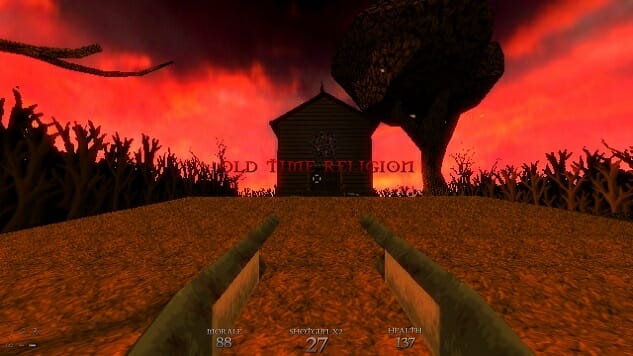
The moment that I realized that Dusk was something special was when I found myself straining to get the right angle for a screenshot of the ominous red sky over the small logging complex of one of the earlier levels.
It was after a series of pitched gun battles in the beautiful way that Dusk does gun battles—constant dances of positioning and firing, a sort of performative elegance scored by shotgun blasts and enemy cultists calling me a heretic. The early levels of Dusk luxuriate in these mood pieces, circling around abandoned cathedrals in the woods, the sky low and threatening, as chainsaw-wielding rednecks in white hoods chase you through the gorgeous low-poly environment.
Dusk is the type of game that made me realize exactly why Quake and Doom before it were so foundational. There really is nothing like a game that feels just as interesting in its mechanics as it does in its themes, and Dusk excels at both. The aforementioned gun battles, along with classic key-and-door puzzles, are nestled within a sparse narrative that takes you from dark Americana, to hellish factories, to underground bunkers, to the darkest depths of a haunted earth and back again. Nearly every moment in Dusk feels like a paean to a lost age of level design and over-the-top grandiosity in theme.
The game isn’t without its stumbles. The slower sections focused on melee combat didn’t land well for me, and some of the later levels lost the beautiful vistas characteristic of the game’s first two zones. But these are short, and relatively reasonable even in their frustrations. Even the slower sections of the game are dense with secret areas, little cracks in walls that can be blown up with an explosive or a well-thrown gas can, gemstones behind hidden buttons, or high-power collectibles on top of spires that can only be accessed by jumping at just the right angle when going just the right speed.

There’s something about the game’s sense of deep care and reverence for its various source materials that stops it from just feeling like a clumsy love letter to Quake. The game’s strongest levels rely just as much on their placement of enemies as their readability and movement options, in a way that belies a deep understanding of how to create interesting levels, not just levels with a single good gimmick or memorable set piece. Guns are varied and none replicate another’s functions. While the rocket-launcher-esque Riveter may deal comparable damage to the Mortar Launcher, the latter’s bouncing projectiles offer more tactical opportunities than the former’s straightforward package. Everything feels meticulously tuned and thought out, from ladder placement to enemy spawn locations.
When 2016’s Doom came out, I considered it the smartest evolution of the Doom/Quake-style fast movement, fast shooting design. I still mostly hold to that opinion, as it’s a slick, shiny reinvention of the same basic gunplay that the game’s name would imply. But in so many other ways, 2018’s scrappy indie Dusk feels like just as much an heir to the throne of the ‘90s twitch-shooter as the AAA behemoth that was Bethesda’s Doom.
It is rare that I find myself as enamored with a game as this one. From aesthetic to gameplay to music and audio design, it feels like a masterwork in what it is attempting to convey. The farmlands are full of cultists. The cities are full of soldiers. The caverns are full of monsters. Here is a shotgun. Welcome to Dusk.
Dante Douglas is a writer, poet and game developer. You can find him on Twitter at @videodante.